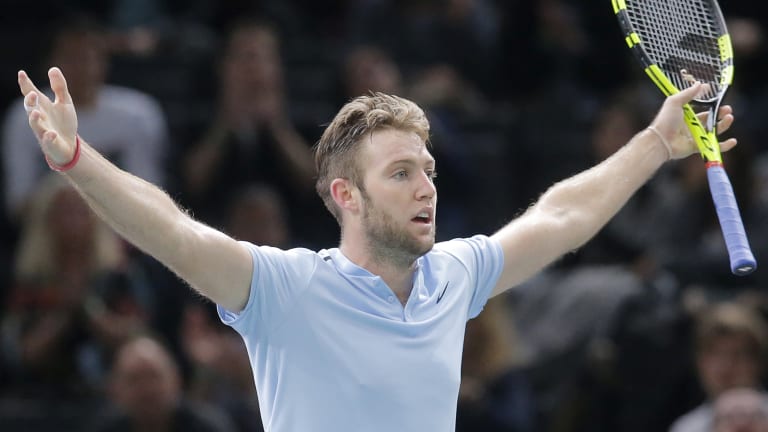Yet he has also, by his own admission, struggled with the mental side of the game, and the tour grind took its toll this year. Did Sock lack confidence, or lose concentration easily, or get tired? It has often been hard to read his body language, as he ambles around the court shaking his head and jawing with his team. A master of the marathon match, he has had a tendency to play to the level of the opponent, rather than taking the proceedings into his own hands.
All of that was different in Bercy. The change came in the third set against Edmund. Sock ditched the baseball cap he usually wears, and cut down on the dialogue with his team. With the 2017 finish line finally in sight, he looked chastened and unburdened, as if he had nothing left to lose and was going to give whatever he had before the season was officially over.
From that point on, in his win over Edmund and his subsequent wins over Lucas Pouille, Fernando Verdasco, Julien Benneteau, and Krajinovic, Sock never allowed himself to become perturbed. Instead of letting one lost game to turn into three, or letting a lost set turn into a lost match, he calmly worked to regain the advantage. Rather than try to knock off a winner with his first shot, he worked the ball side to side with his forehand until an opening presented itself. Sock came back from a set down against Pouille and Krajinovic, and while none of his opponents were in the Top 10, each of them had been on a roll lately. Sock stopped them all.
The peak for Sock came in the third set against Krajinovic, when he hit three running passes for clean winners, two of which came on break points. But what I liked best was how Sock played the service game in between those breaks. He powered body serves into Krajinovic, and when they worked, he threw a fist-pump toward his team. This was Sock taking over the match, showing his desire, and raising his level above his opponent.
His Bercy win reminds me of his fellow American Sloane Stephens’ run at the US Open. Both began feeling like they had nothing to lose—Stephens was coming back from injury, Sock was wrapping up a long season—and things snowballed from there. Before they knew enough to get nervous or feel pressure, they were doing things they may never have thought possible. When I asked above what got into Sock this week, the better question may have been, “What did he leave behind?” He played this tournament without frustration, without too much emotion, without the usual ups and downs.
“I’d be lying if I said 18 months ago I was mentally prepared to win matches like this,” Sock said. “It’s something I’ve worked really hard towards. It’s something that, if you put your nose down and keep fighting, good things can happen. Crazy things can happen.”
As with Stephens, the ups and downs will likely return for Sock in the future. Pressure may build, the tour grind may get to him, and his forehand will misfire. But “Jack Sock, Masters winner” won’t sound crazy to him, or us, anymore.
